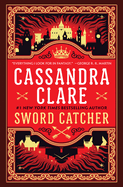
"There has always been magic." This perfectly captures the essence of Sword Catcher, the first book in Cassandra Clare's (Shadowhunter Chronicles; Clockwork Prince) new epic adult fantasy series. Indeed, there is magic in some form everywhere within these pages, from the spellbinding world-building of the city of Castellane to the magic system practiced by the small, isolated community of the Ashkar. In this thrilling story, Clare whisks readers away to a world of decadence and conspiracy, where most characters have one thing in common: a desire for power and wealth.
The "Sword Catcher" in the title refers to Kel, an orphan torn away from all he knew and brought to the city's castle to be the body double for the young prince, Conor Aurelian. The first part of the novel follows the two boys as they grow up together, becoming as close as brothers. Kel's future, had he stayed in the "Orfelinat," or orphanage, would have culminated in a lowly fate: "He could scrape by as a lamplighter, or a ship's boy if he was lucky, and would be poor as dirt." Instead, as Sword Catcher, he would live in the Palace and have whatever he desired. The only catch is that, through the use of talismans and charms, he would be made to look like the prince and might need to sacrifice his own life to protect his royal counterpart.
Kel soon comes to realize that the world of the palace is filled with shifting alliances, shadowy secrets, and political maneuverings. In addition to these intrigues, readers are introduced to the criminal underworld of the "pickpockets of the Warren"; the "well-known tale in the Maze about the Ragpicker King, the most famous criminal in Castellane"; and the walled area of the Sault, where the Ashkar live. Clare gives these groups complex, detailed histories and mythologies--their cultures feel layered, vibrant, and alive. She is well-known for character diversity in her stories, and the world of Castellane does not disappoint in this regard. With the Ashkar, she has showcased an under-represented culture in the fantasy genre by including elements from Jewish traditions, such as the wisdom of the Sanhedrin.
An assassination attempt in the royal court brings Kel and Lin Caster, a female physician and member of the Ashkar, together as they navigate a network of secrets and conspiracies. Behind the scenes, the enigmatic and dangerous overlord of the underworld, the Ragpicker King, oversees and orchestrates events with subtle, wily charm. Clare's perfectly paced plot--with exciting action sequences, forbidden romance, and cloak-and-dagger machinations--propels the action forward, drawing readers deeper into the web of mysteries and secrets in which Kel and Lin find themselves.
Through Kel's story as a forcibly displaced orphan whose new sole purpose is to give his life for another, as well as Lin's experience as part of the Ashkar community whose members are ostracized for their ability to use magic, important themes are addressed--identity, prejudice, and belonging. Lin thinks of herself as "knowably, clearly, Ashkar--alien in a way the sailors who thronged the port of Castellane simply weren't. Travelers had a clearly delineated role and place. The Ashkar did not." Lin also must deal with the inequity of women in a religious society. She questions the status quo: "for a religion that purports to worship a Goddess, who was once a powerful Queen, there are a great many men making decisions about what I, a woman, can read and do."
The magic system Clare creates is fascinating, with events in the past contributing to a world where all magic has been erased, except for the "small spells and talismans of gematry, the ancestral magic of the Ashkar." She also does an incredible job of building an immersive world, from the landscape and architecture to the embroidery on sumptuous clothing. Readers, and Kel, are first introduced to Castellane with this imagery-rich portrayal of the city as "huddled in the bottom of the valley like a hedgehog reluctant to poke its nose out of the safety of its lair."
Throughout the novel, each detail is meticulously and elegantly crafted--nothing overlooked--so that the world of Castellane and the Ashkar tantalizes and teases every sense, as in this evocative description of a library: "These books were as beautiful as the sun sinking behind Tyndaris. Kel could smell the scent of the leather that bound them, the ink on their pages, the bitterness of the stamping mill where the paper was made." Clare's characters are written with nuance, wit, and depth, making them relatable and likable. This, coupled with the breathtaking world that she has created, will leave readers yearning to return to Castellane, and soon, for the conclusion of this grand and twisty adventure. --Grace Rajendran

